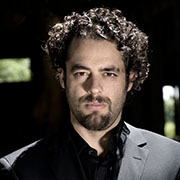The composer and conductor Carlo Ciceri, who passed away in March 2022 at a young age and hailed from Italy, created much more than just a COVID-safe chamber version of the originally planned opera with "L’ultimo sogno — Un‘immagine di Traviata" for the Staatstheater Kassel, initiated by General Music Director Francesco Angelico. The work had its premiere in Kassel in September 2020.
His intensification of Verdi's score preserves the vocal parts in their original form but deprives them of some of the applause-inducing final effects. However, it is precisely this applause that nourishes the soul of a singer, especially at a time when they are rarely able to captivate the audience.
Dramaturgically consistent is Ciceri's decision to portray his main character, Violetta Valéry, not only musically as in Verdi's score but also dramaturgically destined for death from the first second, experiencing the events of the opera as a feverish flashback. Violetta, who is dying from a lung disease, dreams her last dream, which is the dream of her own life. In this dream, she sings many of her world-famous melodies, but the newly composed orchestral and choral voices transform them into something ominous. While Violetta's aria "Sempre libera" reaches its final note, it does so in a sudden pianissimo, causing the aria to fade away in the short coda instead of ending triumphantly. Ciceri places Verdi's work under a magnifying glass, much like the virus does with so many societal ills: the opera as a prolonged dying in one act. Verdi's exalted melody of the divided violins at the beginning of the prelude becomes, at the latest during its repetition at the beginning of the originally planned third act, a musical cipher of death.
"L'ultimo sogno" ends with a question mark. Ciceri denies his protagonist the expected final note. Violetta's last surge of life after the return of her beloved Alfredo is cut off at the first syllable of the fortissimo expression of joy, and the chorus and orchestra withdraw her breath of life in a long diminuendo. From the beginning of his adaptation, Ciceri immerses Verdi's "La Traviata" in an eerie yet fascinating dark light that illuminates the artistic power inherent in the music: to give inevitable dying a comforting and affirmative expression.
Olaf A. Schmitt



